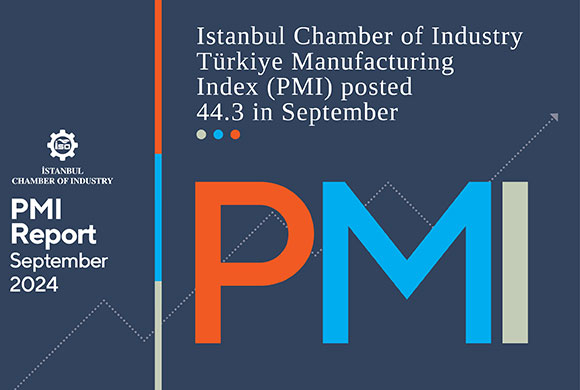News
ICI Released September 2024 ICI Türkiye Manufacturing PMI and Türkiye Sector PMI Report
- 01.10.2024
- News

The headline PMI dropped to 44.3 in September from 47.8 in August. This slowdown was also the most pronounced since May 2020. Business conditions have now moderated in six successive months. Output eased in response to muted new order inflows, extending the current sequence of moderation to six months. Moreover, output was scaled back to the largest extent since May 2020. Currency weakness and higher raw material prices led to a further increase in input costs during September.
According to the Istanbul Chamber of Industry Türkiye Sector PMI report, new orders moderated in all 10 monitored sectors in September. The most significant deceleration was recorded in clothing and leather goods, while the slightest slowdown was recorded in food products. Input costs increased significantly in all ten sectors. The highest increase was recorded in the chemicals, plastics and rubber products sector, while the weakest was recorded in basic metals. For the first time in nearly six years, employment declined in all ten sectors monitored under the survey, with the most significant one being in the textile sector.
Istanbul Chamber of Industry (ICI) released the September 2024 results of Türkiye Manufacturing PMI (Purchasing Managers’ Index) survey, which is recognized as the fastest and reliable indicator of the manufacturing industry’s performance in the economic growth. According to the survey results where any figure greater than 50.0 indicates overall improvement of the sector, the headline PMI dropped to 44.3 in September from 47.8 in August, signalling a marked slowdown in the sector. This slowdown was also the most pronounced since May 2020. Business conditions have now moderated in six successive months.
There were widespread reports of demand weakness in September, leading to the sharpest slowdown in new orders in almost four-and-a-half years. Subdued demand in international markets was also signalled by a renewed moderation in new export orders. Output eased in response to muted new order inflows, extending the current sequence of moderation to six months. Moreover, output was scaled back to the largest extent since May 2020.
STOCKS OF INPUT AND FINISHED GOODS REDUCE FURTHER
Demand weakness and lower output requirements led manufacturers to scale back their employment and purchasing activity to larger degrees in September. Some firms indicated that full-time workers had departed during the month, leading to the most marked easing of staffing levels since April 2020. Stocks of both inputs and finished goods were reduced, while subdued demand for inputs relieved pressure on supply chains, resulting in the first shortening of lead times in nine months. Currency weakness and higher raw material prices led to a further increase in input costs during September. The rate of inflation remained marked, despite easing to a three-month low. In turn, output prices also rose, with charges increased at a broadly similar pace to August.
Commenting on the Istanbul Chamber of Industry Türkiye Manufacturing PMI survey data, Andrew Harker, Economics Director at S&P Global Market Intelligence, said: "The latest PMI data paint a worrying picture for Turkish manufacturers as the sector moved deeper into its period of moderation at the end of the third quarter. Many firms reported demand weakness, and the struggles to secure new business led them to scale back output, employment and purchasing again. While inflationary pressures aren't currently as severe as they have been in recent years, the stillmarked increases in prices won't be helping to improve the demand environment.”
NEW ORDERS SLOW FOR THIRD MONTH IN A ROW
Türkiye's Sector PMI report indicated that manufacturers reduced employment in September due to weakness in new orders and output requirements. For the first time since November 2018, the volume of employment contracted across all monitored sectors. Prices remained on an uptrend overall, but supply chains improved in most sectors amid sluggish demand for inputs. In September, new orders slowed for the third consecutive month in all ten monitored sectors. The most significant deceleration was recorded in clothing and leather goods, while the slightest slowdown was recorded in food products. The outlook for external demand was relatively favorable, with increases in three of the ten sectors, led by food products.
EMPLOYMENT DECLINES IN ALL MONITORED SECTORS
In line with the picture in total new orders, there was a general decline in output. The sharpest contraction was seen in the machinery and metal products sector. Despite the decline in output, the stagnation in new order inflows caused the general downward trend in backlogs to continue. Manufacturers reduced the volume of employment in September in response to lower workloads. For the first time in nearly six years, employment declined in all ten sectors monitored under the survey, with the most significant one being in the textile sector. There was also a widespread weakening in purchasing activity. The generally subdued demand for inputs eased some of the pressure on supply chains in September. As a result, suppliers' lead times shortened in many sectors. The most notable improvement in supplier performance was in wood and paper products, where lead times decreased at the highest rate in the history of the survey.
Input costs increased significantly in all ten sectors. The highest increase was recorded in the chemicals, plastics and rubber products sector, while the weakest was recorded in basic metals. Firms increased their finished goods prices in all sectors due to the rise in input costs. The price inflation in electrical and electronic products accelerated markedly to a seven-month high. In the textile sector, on the other hand, the increase remained quite moderate.
*You can find attached the Istanbul Chamber of Industry Türkiye Manufacturing PMI and Sector PMI September 2024 reports.